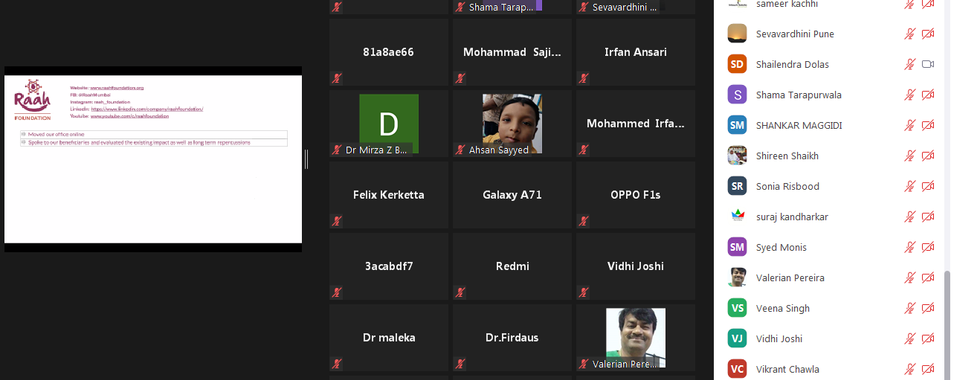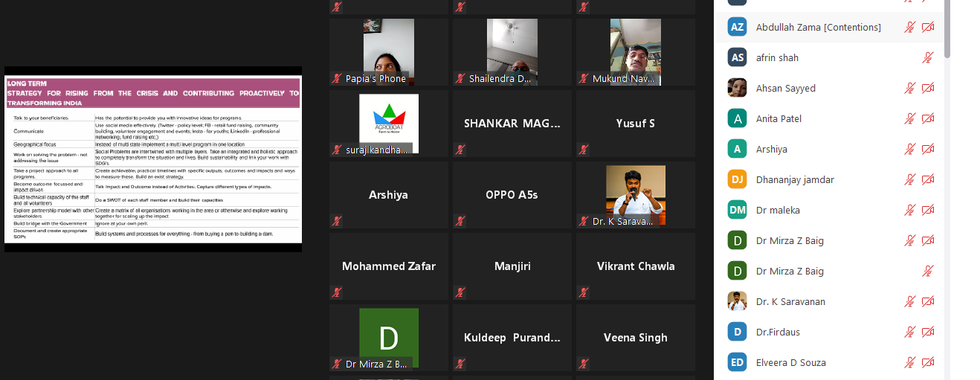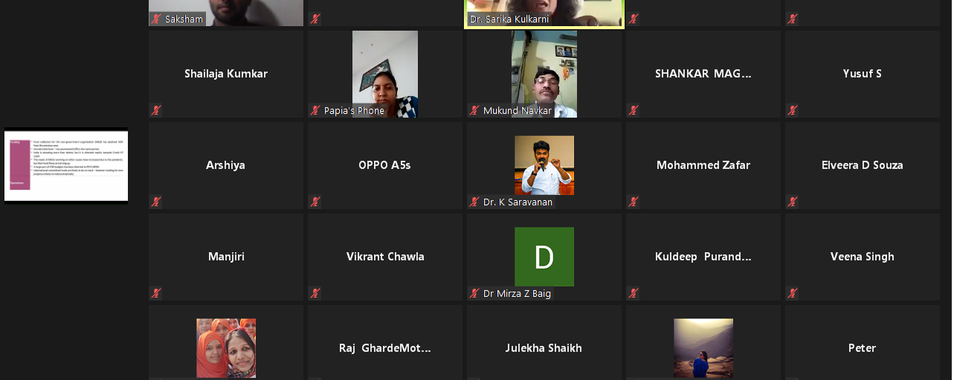Webinar on "NGOs- Transforming the Future of India" By Dr. Sarika Kulkarni
- Jul 23, 2020
- 4 min read
Updated: Jul 12, 2022
We had the privilege of hosting Dr. Sarika Kulkarni, Director of Raah Foundation with us on 22nd July 2020.
She has a Ph.D. in Operations from Maharaj Nagpur University and a Professional Masters Degree in CSR and Sustainable development from the Asian Institute of Technology.
She has also been the CEO of IIFL Foundation until march 2019, IIFL helped transform rural areas by enhancing the quality of education and by linking education to employability, through women empowerment and through adopting preventing health interventions. In 2011 she founded Raah.
The mission of the organization is to drive a holistic change in the lives of the tribals by creating local opportunities and enabling them to lead an honorable life in their own villages. Raah Foundation works on the following objectives: To facilitate sustainable development in the lives of tribals of Maharashtra through a multi-pronged, multi-dimensional approach needed to address the different intertwined layers of social problems. Different programs of the Foundation include: Watershed development (building check dams, wells, etc. to create additional sources of water), Agriculture Development (training in farming techniques, seeds & sapling distribution, support in drip irrigation, forming marketing linkages), Livelihoods (women micro-businesses - grocery shops, dry fish selling, vegetable vending, food stalls, etc.), Traditional Art businesses (patchwork and warli art) and Health (focus on malnourished children)
She started her introduction on the note that you truly develop and gain ground when you benefit from your qualities and afterward referenced how Covid19 is influencing various associations and Sustainable advancement objectives (SDGs).
She Highlighted that around 1.2 million NGOs are enlisted in India, which is an enormous number of which 53% are in provincial regions while the staying 47% are in Urban. It was properly referenced that it is these NGOs which has contributed enormously to the improvement of the nation.
At that point, the introduction continued to show different qualities, shortcomings, openings, and threats(SWOT) looked by NGOs, governments, and the Corporate.
Dr. Sarika then discussed her magnificent activity of Rice Plantation, where her recipients were rice grower, she requested that they sell the rice with the goal that they can get by for themself. Yet, they were all the while utilizing the conventional method of rice manor on account of which their produce was insufficient for both their utilization and for offering it to get by.
So she stepped up and acquaint them with present-day strategies for rice ranch, for example, SMI and SAR which expanded the yield by multiple times. Doing this, they could in any case save one segment of the yield for their own utilization and offer the rest to continue themself.
Raah Foundation is partly funded by Azim Premji Foundation, Dr. Sarika referenced that one of the issues with NGOs is they center around action and not on sway, however, she saw that when filling the structure to get funds from Azim Premji Foundation, the structure really posed exceptionally applicable inquiries like 'how would you measure your effectiveness?' and things like 'what boundaries do you use for estimating your effect?', and so on.
Talking on a similar line, she referenced how a lot of associations talk about what number of classes and workshops they have orchestrated however don't gauge the real distinction they had the option to make on individuals' lives.
Dr. Sarika said that there are numerous associations chipping away at a similar issue in various geological regions and proposed that as opposed to working in various regions, numerous such NGOs should work in a similar zone in a staggered manner. Thusly the NGOs together will have the option to totally change the region in one specific respect and in this way have a high effect as opposed to having nearly nothing or immaterial effect spread over the whole nation.
She at that point referenced the significance of associating with the legislature and said despite the fact that the administration has its disadvantages, there are acceptable individuals wherever who need to accomplish great work. We were amazed to hear how much support the administration and that too for some things that a great many people are not even mindful of. She gave her own model where she made great relations with a sarpanch of a town and that helped her spare just about 6 lakh rupees for a water pipeline and sun based controlled water siphon has the sarpanch had the option to orchestrate the assets from the administration.
At that point in the light of the present Covid19 circumstance, she featured the significance of moving our workplaces on the web and receiving the most recent advancements for joint effort and different works.
One of the participants posed an inquiry in regards to what to do before beginning an NGO, to which Dr. Sarika addressed that all the documentation ought to be set up with due constancy and originator of the NGO ought to do their homework I.e. have a strong long haul and transient arrangement, do all the necessary exploration, and so forth.
Likewise, the featured significance of conversing with your recipients was additionally referenced as they are the best individuals to enlighten you regarding their necessities.
The meeting closed with a sound inquiry and answer meeting.
Watch the full webinar here


































Comments